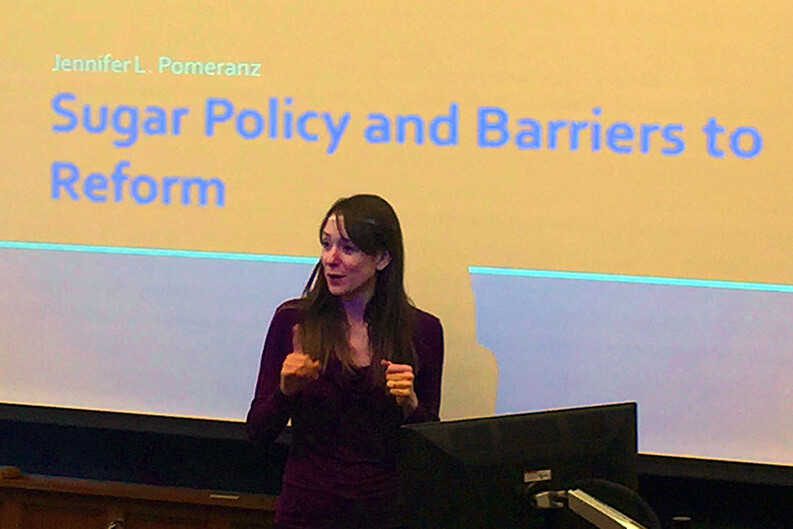Public Health Professor Discusses Sugar Consumption and Regulation

On April 13, 2017, the Solomon Center for Health Law & Policy, along with the Yale Food Law Society and the Yale Sustainable Food Program, hosted Professor Jennifer Pomeranz of New York University's College of Global Public Health for a discussion on public health policy addressing sugar consumption.
Professor Pomeranz's discussion, "Addressing Sugar Consumption and Barriers to Reform," explored sugar taxes as well as other policy mechanisms to address added sugar consumption in the general public and for specific consumers (such as SNAP participants). According to Pomeranz, over time the price of fruits and vegetables have remained consistently higher than sugar and sweets, while common dietary advice encouraged low-fat diets, increasing the likelihood that individuals would consume more high-sugar products. With recent evidence demonstrating the link between sugar consumption and cardiovascular disease, diabetes, and obesity, governments are exploring dietary sugar regulation as a way to bring about behavioral change. As governments and public health officials explore potential reform, Pomeranz said, they must weigh their goals of improving diet, increasing revenue, and implementing a regulatory scheme that is easy to administer.
Pomeranz discussed the relative benefits and disadvantages of applying a sales or excise tax to sugar, and presented several difficult policy considerations involved in sugar taxation, such as whether to tax products based on the use of additive sweeteners, calorie ratio, or ounces of liquid. She also described other nascent regulatory reforms, like an FDA provision requiring reporting of "added sugars" on food product labels.
The lecture concluded with a discussion of the various barriers to implementing these reforms and minimizing sugar consumption in the United States. Significant political barriers, such as strong beverage industry lobbying efforts, and practical barriers, such as the strength of brands such as Coca-Cola, she argued, make sugar regulation more difficult to implement. But Pomeranz emphasized that the legal barriers to sugar regulation are the most influential, with federal and state preemption limiting the ability of cities and local municipalities to exercise their public health police power. Pomeranz argued that developing legal and political strategies to overcome these preemption challenges should be a main priority for lawyers and scholars working in the public health law space.
Prior to joining the NYU faculty, Pomeranz was an Assistant Professor at Temple University in the Center for Obesity Research and Education in the College of Public Health. She was previously the Director of Legal Initiatives at the Rudd Center for Food Policy & Obesity at Yale University, and holds esteemed positions as the Policy Chair of the Health Law Section of the American Public Health Association and the official liaison between the American Academy of Pediatrics and the American Public Health Association.


